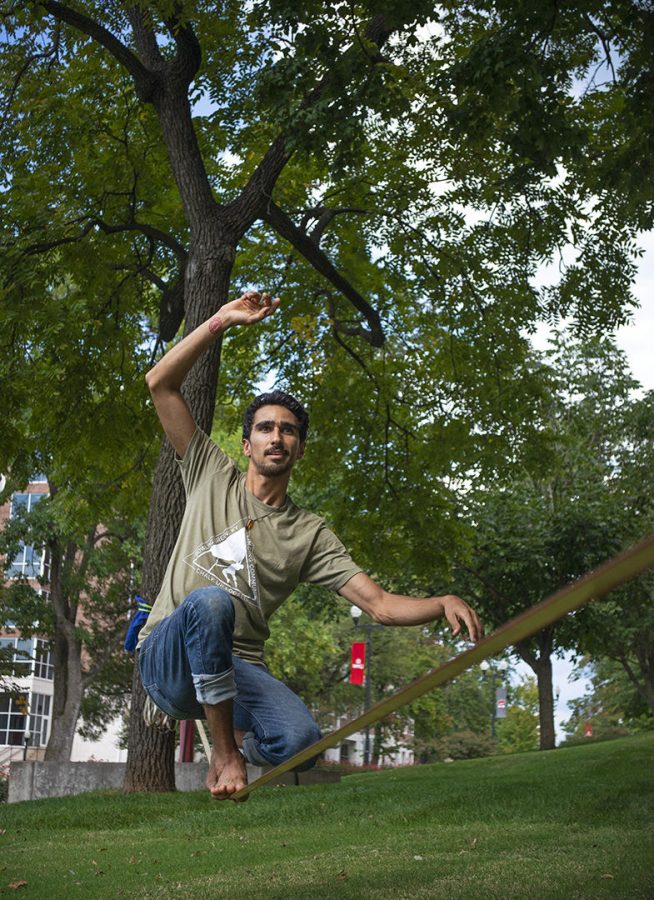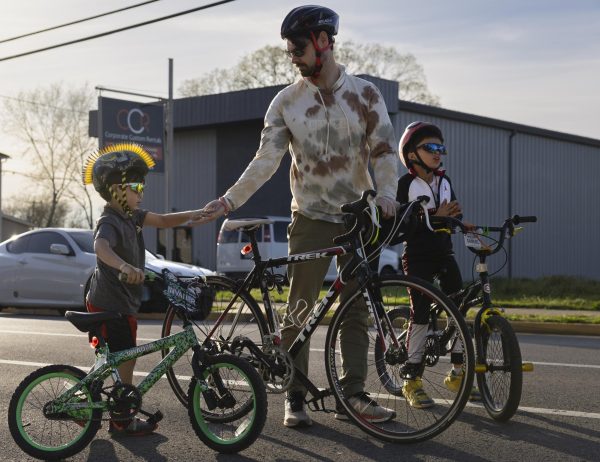Caving enthusiast brings slackline hobby to campus
September 24, 2018
Every other Friday, Fernando Hernandez can be found around campus, resting on top of a thin, outstretched rope, arms extended side-to-side with his eyes focused on the other end. Even with the noisy crowds of students around him, nothing seems to be able to pull Hernandez out of focus.
Slacklining is the act of walking across a suspended rope between two points. It is very much like tightrope walking; the difference is slacklining uses webbing, a thin and stretchy rope.
“Even though I’m doing this climbing and this caving, this is where I just come and relax,” Hernandez said.
Hernandez, a geoscience graduate student, said he uses the hobby to relax, learn how to concentrate, keep balance and ease his mind when his workload becomes stressful. He is a cave enthusiast who moved from Mexico to Texas to now Kentucky to explore and study the inner workings of caves and how they form.
When Hernandez isn’t working on his thesis or exploring caves, he likes to take time out of his day to slackline and work on his balance, often doing so in front of Downing Student Union or Gatton Academy.
Hernandez said slacklining is a way for him to ease his mind. He has practiced the hobby for more than a year.
“At the beginning, it’s hard to move your body correctly, and all of the sudden it clicks,” Hernandez said. “It’s like riding a bicycle. It eventually just comes natural to you.”
Hernandez said he often takes two-week expeditions in caves and stays there to gather and analyze data he finds in places like Mammoth Cave National Park.
He said slacklining has helped develop his cave exploration skills by improving his concentration, balance and physique.
Cave exploring is sometimes a dangerous profession. As Hernandez puts it, “you cannot make a mistake,” and skills are required for executing safe explorations.
Jason Polk, associate professor of geoscience and director of Center for Human GeoEnvironmental Studies, has worked closely with Hernandez during cave explorations.
“[Slacklining] certainly helps with hard environments, such as caves and so those things require a lot of physical activity, which includes climbing, rope work and having good balance,” Polk said. “In the end, it all sort of works together, as that type of skill set is needed by people with these careers where they explore hard to reach places.”
Polk is one of the faculty members at the Department of Geography and Geology who convinced Hernandez to study at WKU and has worked with him almost every day for nearly a year.
Hernandez mentioned he would be willing to help teach those interested in taking up slacklining as a hobby. He often brings extra ropes with him every other Friday near DSU around 11:30 a.m. – 2:00 p.m.
Hernandez said those wanting to learn are “welcome to ask.”
Features reporter Maxis L. Bryant can be reached at 270-745-6291 and [email protected].

























